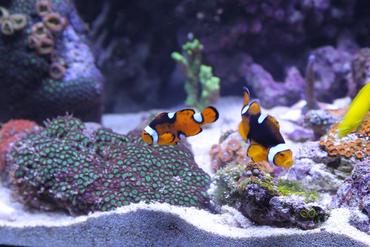FEEDING CORALS - KEEPING YOUR SALTWATER INVERTEBRATES HEALTHY

Common Misconceptions
Modern aquarium hobbyists are much more educated in regard to caring for saltwater invertebrates than they were even a decade ago. It was once believed that corals did not need to feed, that they possessed internal food-producing organisms called zooxanthellae which made it unnecessary to feed them in the saltwater tank. For many years, most species of coral were assumed to be autotrophic, requiring only light in order to survive. Recent studies, however, have proved that corals need to be fed just like any other saltwater creature. Due to this misconception, many species of coral were labeled difficult to keep because they had a tendency to die slowly over time, the result of starvation.
Another misconception regarding the feeding habits of corals is that large polyp corals are more active feeders than small polyp corals. Because large polyp corals exhibit larger or longer tentacles than their smaller cousins, it is often assumed that they obtain a larger percentage of their daily nutrition from food that floats by than from the zooxanthellae algae they produce themselves. Recent discoveries suggest, however, that small polyp corals actually feed more aggressively than large corals. In order to cultivate corals in your saltwater tank, you need to understand the feeding habits of the particular species you intend to cultivate so you can provide for their nutritional needs.
How Corals Feed
Most species of coral are mixotrophic meaning they utilize both heterotrophic and autotrophic methods of feeding. Heterotrophic organisms subsist largely on active feeding, absorbing nutrients from the environment while autotrophic organisms produce their own food using sunlight as energy to synthesize the process. You may not realize it just by looking at them, but a significant portion of the body of most corals is devoted to gathering and absorbing food. You may not realize it just by looking at them, but corals have a very complex morphology designed to capture zooplankton from the surrounding water.
The autotrophic aspect of most coral species involves the production of zooxanthellae which provide corals with a majority of their daily energy requirement – additional vitamins and nutrients are needed, however, to keep corals healthy. Essential nutrients like proteins, lipids and carbohydrates are necessary to build new tissue. Different types of corals derive these nutrients from various sources. Most coral species are actually carnivorous, feeding on various copepods, chaetognaths and larvae produced within the coral reef itself. Soft corals like zooanthids and gorgonians, on the other hand, subsist largely on phytoplankton as well as detritus and floating plankton. Another important food source for corals is bacterioplankton, the bacteria which can be found in detritus and other organic debris.
Tips for Feeding Corals
Feeding corals is not quite as straightforward as feeding saltwater aquarium fish. Whereas you can feed fish by sprinkling a few flakes or pellets on the surface of the tank, feeding corals requires a little more effort. The first thing you should do is research the particular species of coral you have in your tank so you can cultivate an understanding of their nutritional needs. Certain species of coral prefer different types of food and if you simply inject a wide range of food sources into your tank the uneaten portion could have a negative effect on your water quality in terms of increased nitrite and nitrate levels.
Many saltwater aquarium hobbyists go the route of offering their fish foods that their corals will also be able to eat – many large polyp corals, for example, are likely to consume small bits of krill, shrimp and clams in addition to phytoplankton. Not only will the corals consume this type of food, but they will also obtain nutrients from the tank water as aquarium fish digest their food and excrete waste. Indirect feeding is the means by which corals absorb dissolved organic compounds directly from tank water – this feeding method is especially common in small polyped corals which cannot consume large pieces of food.
In addition to offering your saltwater fish foods your corals will eat, you can also purchase commercial foods designed for corals. Look for products like marine snow (a material composed of bacterioplankton) and rotifer cultures in addition to live phytoplankton. You may also be able to concoct your own coral food mixture by blending shrimp, clams, krill, commercial foods and fresh vegetables until pureed to the point where small polyped corals will be able to eat it.
Cultivating a reef tank is an incredibly challenging but rewarding experience. If you want to see your corals thrive, you would do well to research their feeding habits so you can provide for their nutritional needs.
































































































